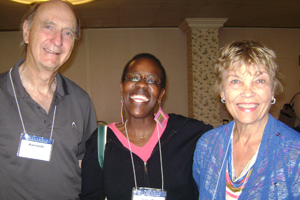
Prof Kenneth Gergen, Dr Jennifer Githaiga and Prof Mary Gergen
Photo: Supplied |
Among international delegates from over 60 nations and more than 1 300 participants, Dr Jennifer Githaiga presented her paper on the practice of mourning – the African way.
Her paper questioned the language used in psychology to ‘pathologise’ African people’s mourning practices. Drawing from her doctoral research, she explained the role of maintaining close bonds with family members after they pass away. Rather than severing these bonds, Dr Githaiga argued that continued attachment beyond death plays a significant role in healing the trauma of loss.
Dr Githaiga’s entitled her paper ‘The “pathology” of post-bereavement bonds: cultural positioning in qualitative inquiry.’ She presented this at the Tenth International Congress of Qualitative Inquiry (ICQI). A conference that has become one of the most important events on the calendar of qualitative researchers across the globe. The event was hosted at the University of Illinois in Urbana-Champaign from 21 - 24 May 2014. The theme of the conference this year was ‘Qualitative Inquiry and the Politics of Research’.
Dr Githaiga is currently a postdoctoral fellow at Trauma, Forgiveness and Reconciliation Studies at the UFS. During the congress, she also found herself in the role as ambassador to Kovsies. Not only did she rub shoulders with highly-regarded Profs Kenneth and Mary Gergen, but also spoke with leading scholars in the field of qualitative research interested in our university.